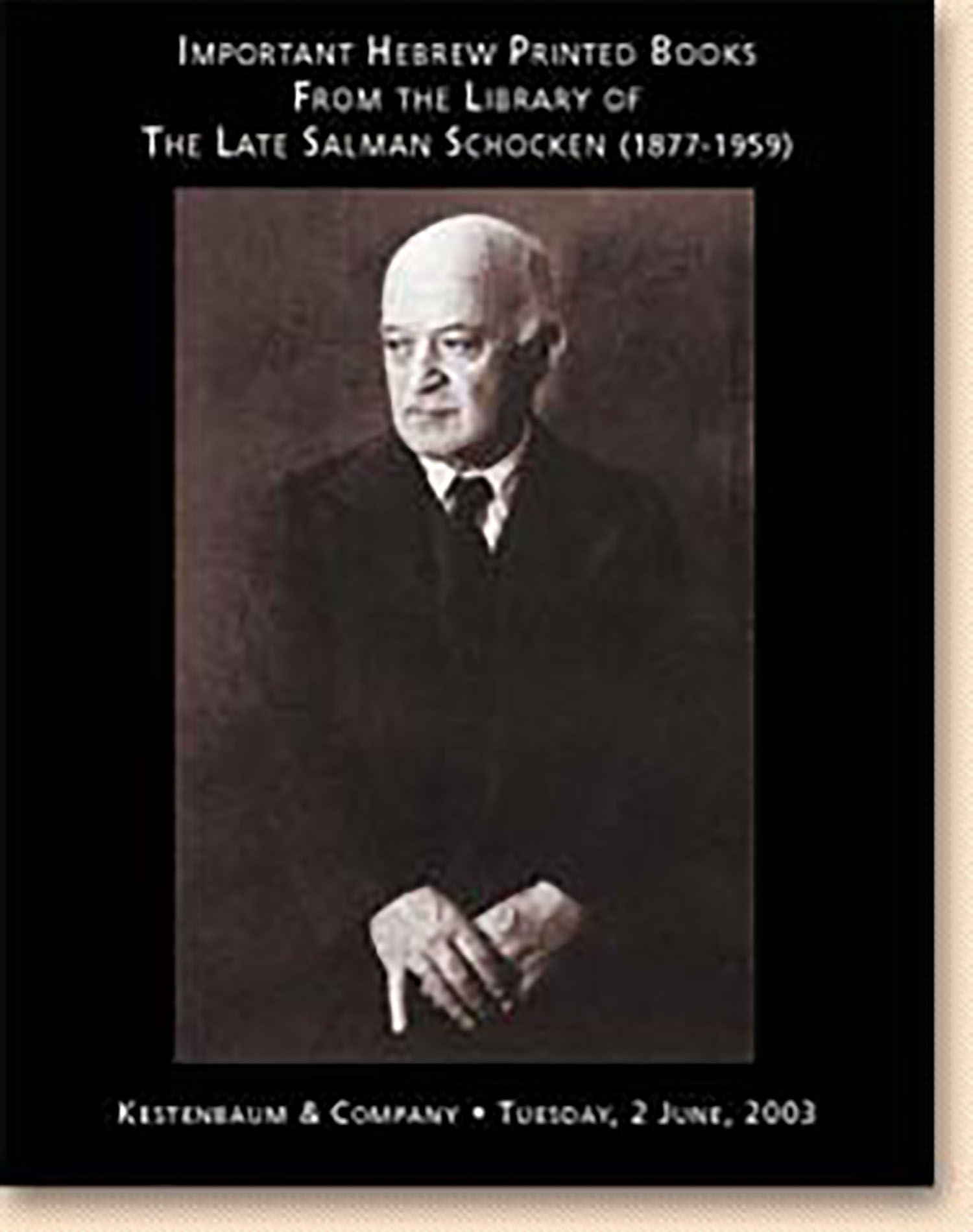Mishneh Torah (Yad Ha’chazaka). [“The Strong Hand”- Rabbinic code]. With commentaries of Abraham ben David of Posquieres (RAVa”D), Magid Mishneh, Hagahoth Maimoni’oth, Migdal Oz and Perush Hilchoth Kidush Ha’chodesh by Obadiah ben David

AUCTION 20 |
Monday, June 02nd,
2003 at 5:00
Important Hebrew Printed Books from the Library of the Late Salman Schocken (1877-1959)
Lot 31
MOSES BEN MAIMON (MAIMONIDES /
Mishneh Torah (Yad Ha’chazaka). [“The Strong Hand”- Rabbinic code]. With commentaries of Abraham ben David of Posquieres (RAVa”D), Magid Mishneh, Hagahoth Maimoni’oth, Migdal Oz and Perush Hilchoth Kidush Ha’chodesh by Obadiah ben David
Constantinople: David & Samuel ibn Nachmias 1509
Est: $40,000 - $60,000
PRICE REALIZED $135,000
* Maimonides’ Rabbinic Code: Categorized into fourteen groups and hence known as the “Yad (=14) Hachazaka”, the work forms the first complete classification of the Mosaic and rabbinical laws. Each group constitutes a book, and each book is subdivided into sections, chapters, and paragraphs. Maimonides sources include the Babylonian Talmud, the Jerusalem Talmud, the Halachic Midrashim, and the Sifra, Sifre and the Mechilta. With this, he surpassed all his predecessors, none of whom made such extensive use of the Jerusalem Talmud and Halachic Midrashim. On occasion Maimonides gives preference to these works rather than the Babylonian Talmud. Manifestly, Maimonides’ primary authority was the written Torah itself. However, there are many regulations and laws contained in the Mishnah Torah which are not mentioned in Talmudic or Midrashic works, but which were deduced by Maimonides through independent interpretation of the Bible. Maimonides deviated from custom in his choice of language, preferring the Hebrew of the Mishnah, to Aramaic, the customary Talmudic idiom.
As soon as it appeared, the Mishnah Torah was met with controversy and Maimonides was accused of wishing to destroy all study of the Talmud. Blame was also heaped upon him for his neglect in citing sources. Maimonides responded to these challenges by stressing that his desire was only to supply a Code necessary lest pupils weary of the difficult study of Talmud and thus might go astray in decision-making of practical importance. Maimonides omission of sources was due solely to his desire for brevity and he regretted that he had not written a supplementary work citing authorities pertaining to those Halachoth whose sources were not evident from the context.
* Abraham ben David of Posquieres (RAVa”D) Commentary: Born in Provence, France, about 1125, the Talmudic commentator Abraham ben David of Posquieres (RAVa”D) was a harsh critic of Maimonides’s Code. In his opinion, a legal code which did not state the sources and authorities from which its decisions were derived, and offered no proofs of the correctness of its statements, was entirely unreliable for this made it difficult, if not impossible, for scholars to verify his statements,and compelled them to follow his decisions absolutely. Such a code could only be justified if written by a man claiming infallibility. If it had been the intention of Maimonides to stem the further development of the study of the Talmud by reducing it to the form of a code, the RAVa”D felt it his duty to oppose such an attempt, as contrary to the free spirit of rabbinical Judaism.
His detailed critical commentary to the Mishneh Torah, rejects Maimonides’ rulings point by point. He is particularly severe in ferreting Maimonides attempts to inject personal philosophic views under cover of Talmudic passages. The criticism is skilfully presented. RAVa”D’s comments are seldom more than a few lines in length and evince his remarkable command of the entire Talmudic literature, the extraordinary breadth of his intellect and phenomenal critical powers.
The fact this commentary is incorporated into this edition of the Mishneh Torah is testimony to the freedom of thought that characterize Jewish scholarship. Indeed, this edition contains Shem Tov ibn Gaon’s Migdal Oz that subsequently rejects RAVa”D’s views and in turn defends Maimonides.
On the controversies surrounding Maimonides and his Mishneh Torah, see M. Carmilly-Weinberger, Censorship and Freedom of Expression in Jewish History (1977), pp. 27-36.
For a detailed discussion comparing this 1509 to other Maimonides editions - especially the Hagahot Maimonioth which are much more extensive with substantial differences, see the introduction by Prof. S.Z. Havlin to the facsimile edition (1973)
